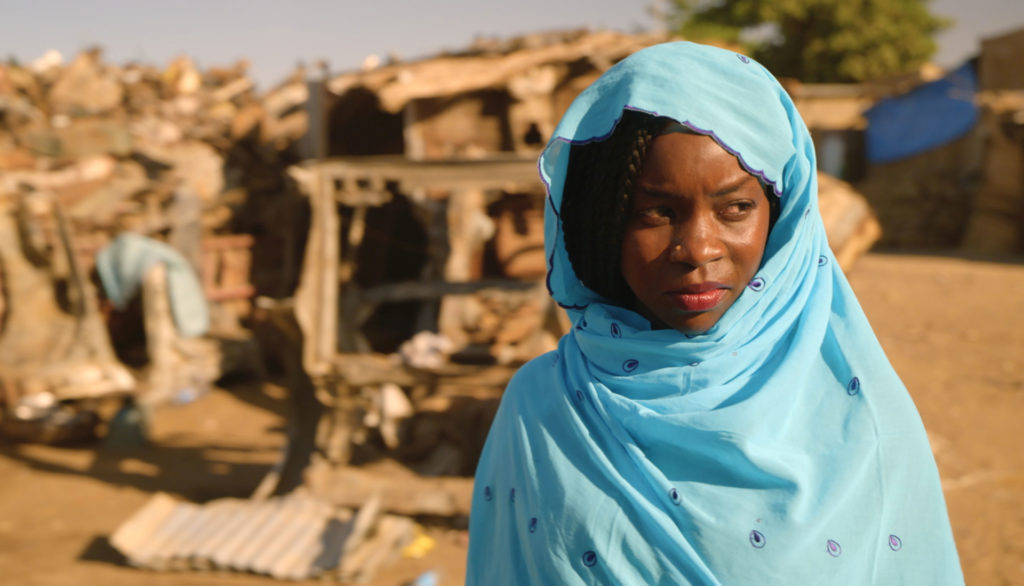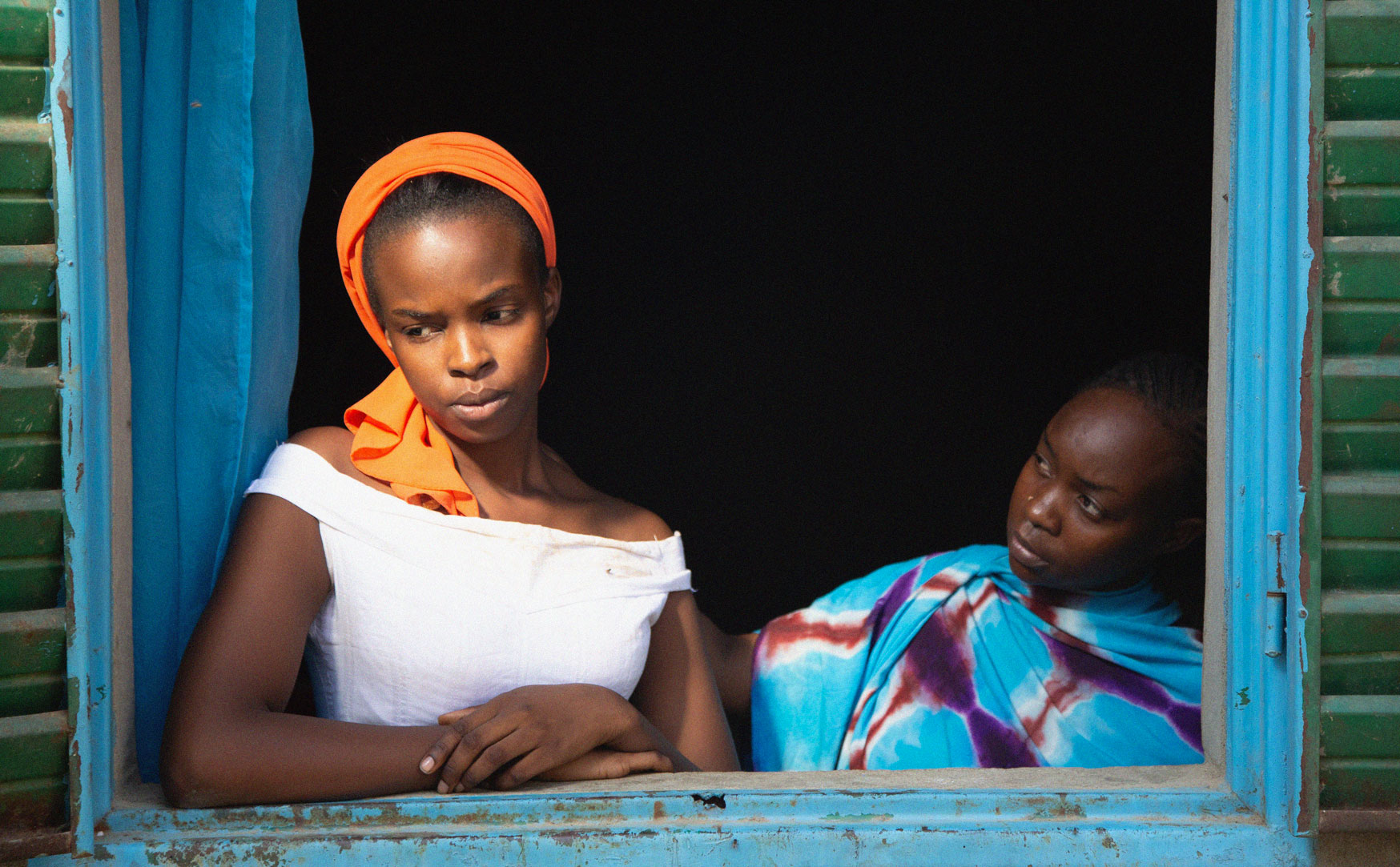The word “lingui” in Chadian Arabic means “a connection,” “a bond.” It’s a word that implies that communal responsibility is above all else. In “Lingui, The Sacred Bonds,” the term is first uttered by Fanta (Briya Gomdigue), who, in a time of crisis, turns to her estranged sister Amina (Achouackh Abakar), who is dealing with a crisis of her own, where her lingui to Chadian society, to her religion and to her daughter are pulling her in different directions. Amina has to choose which bond takes precedence.
“Lingui, The Sacred Bonds,” by director-writer Mahamat-Saleh Haroun, tells the story of Amina, a single parent who sells coal stoves, which she makes out of recycled truck tires. Amina, after noticing the sudden isolation of her 15-year-old daughter Maria (Rihane Khalil Alio), follows her to school one day, only to learn that Maria was expelled because she had gotten pregnant. Maria tells her mom that she wants an abortion, but living on the outskirts of the city of N’Djamena, Chad, legally and religiously, an abortion is not easy to obtain. Their seemingly mundane lives are shattered from this moment as Amina struggles to maintain her faith, navigate her changing relationship with her daughter, and deal with her own repressed feelings about getting pregnant at 15 and raising Maria on her own.
Haroun, a native of Chad and the country’s first feature-length film director, lives in Paris but has made it a point to set a majority of his films in his homeland. From “Abouna” (2002) to “A Screaming Man” (2010) to “GriGris” (2013) — the latter two having premiered at the Cannes Film Festival — most of his stories have been about men and boys. “Lingui, The Sacred Bonds” is Haroun’s first film with female leads and one in which he addresses abortion, a subject that carries stigma and shame. It is also a subject that would resonate with American audiences since the U.S. Supreme Court recently voted to overturn Roe v. Wade. Abortion rights are now in the hands of states, a few of which have already begun to implement abortion bans.
In this powerful tale of a mother and daughter struggling to obtain the medical care they need, Haroun transports us to a Chadian society in which politics and religion form their own bond, where a woman’s body and what she does with it is constantly governed and surveilled. There seems to be no end to the challenges they face, and Amina has to decide how far she is willing to go to do right by her daughter. Abakar plays Amina with a delicacy and tenderness that complements Alio’s portrayal of Maria beautifully, their chemistry never faltering. The lack of music in the background can feel jarring, but it plays into the seriousness and urgency of the situation.
In the U.S., the topic of abortion has resurfaced as a top issue, and the politics surrounding it have skewed who should be centered in those personal decisions. Haroun’s directorial approach to this Chadian story anchors us in reality and not in the theoretical discussions that occur behind closed doors in government offices and religious institutions.
In December 2017, the National Assembly of Chad passed a new penal code decriminalizing abortion under limited circumstances. The updated code states that abortion is permitted in cases of sexual assault, rape, incest and fetal impairment, and when the mental and physical health of the mother is at risk. In “Lingui, the Sacred Bonds,” one of these rules applies to Maria but because she hasn’t said anything yet, it has become difficult for her and her mother to get help. During their first visit to a clinic, the doctor looks at Amina and Maria and says: “Know what I risk? Five years in jail and the loss of my license.” And he’s right — abortions upon request are forbidden, and both the person seeking the abortion and the medical provider are subject to imprisonment and fines.
Out of frustration, Maria gets up and exclaims, “We’re leaving! Other people can do it.” Her words don’t just express her anger toward the doctor; they also expose a dark reality in which people feel their only option is to pursue risky and unsafe channels to get an abortion. With the overturning of Roe v. Wade, that fear has become even more real in the U.S. For those living in states where total bans are to be implemented, it may not be possible to travel to states where the medical procedure will continue to be legal. It then becomes a class and economic issue, and the people most affected by it will be those who already face discrimination in receiving proper health care.

The doctor tells Amina and Maria that there is a clinic that will do the procedure. But it will cost them the equivalent of about $1,600. Amina knows they can’t afford it, and she has to figure out what to do. From here, the mother-daughter relationship hangs on this uncertainty.
In typical Haroun fashion, the storytelling lies in more than just the dialogue. It’s in the vocal cadence, as Maria declares, “I don’t want to be like you, Mom”; it’s in the eyes, as we stare into Amina’s the moment she realizes her daughter’s fate; and it’s in the sounds of N’Djamena from the hums of the motorcycles to the rhythm of sandals hitting the pavement. We are immersed in this world and in this life with Amina and Maria.
In the end, the bonds most sacred are the ones between mother and daughter and the women who move with Amina and Maria throughout their journey. What becomes apparent in the film is that community is where a lot of the work and care lies. Amina and Maria feel most supported at the hands of the nurses who work at the clinic they were referred to. Amina is also forced to deal with her own experience as a woman who is slowly beginning to understand her own agency. As a woman who had a child while still being one herself, Amina is forced to reconcile the lack of support she had with what she needed and deserved but at the same time allows Maria to realize that a different life is possible.
Despite the patriarchal pressures that loom overhead, Haroun gently guides us to focus on the resilience and courage women consistently embody in the face of obstacles that either swallow them whole or are mere bumps in the road to self-realization and to finding genuine community.
“Lingui, the Sacred Bonds” is available to stream on MUBI.



